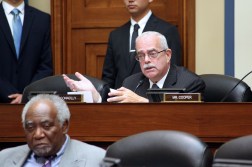The House on Friday passed an amendment to the National Defense Authorization Act that would give more authority to the government’s chief information officers to manage IT investments.
Lawmakers backing the act — the Federal Information Technology Acquisition Reform Act or FITARA — claim it will bring transparency to the IT acquisition process, streamline decision-making and reduce wasteful spending on federal IT programs, estimated to be up to $20 billion a year.
In total, the federal government spends more $80 billion each year on IT products and services. Industry groups — including TechAmerica and the U.S. Chamber of Commerce — have charged that portions of the bill simply restate CIO authorities already signed into law, and want more time to review the bill. Other private sector leaders, such as Amazon and VMware, have supported the bill.
“There are more than 250 identified CIOs in the federal government, yet none possess the necessary authority to effectively manage IT investments,” the bill’s co-sponsor, Rep. Gerry Connolly, D-Va., said in a statement. “This has resulted in duplicative and wasteful IT spending, with taxpayers forced to foot the bill for massive IT program failures that ring up staggeringly high costs, but exhibit astonishingly poor performance.”
House Oversight and Government Reform Committee Chairman Darrell Issa, R-Calif., is the bill’s main sponsor.
The amendment would require agencies to have only one person with the CIO title, pushing many current CIOs down to the title of deputy, associate or assistant CIO. The CIOs at the 16 largest federal agencies would be presidential appointees, and not require Senate confirmation, reinforcing the 1996 Clinger-Cohen Act, which initiated the CIO position. Connolly added the amendment would give the CIO Council more authority to coordinate across the entire federal government, implementing shared services and platforms.
Currently, 47 percent of federal managers’ budget is spent on maintaining outdated or ineffective IT platforms, according to Connolly’s release. The bill’s proponents believe the bill would give agencies the leeway to move away from outdated systems to newer services such as cloud platforms. These decisions would be more transparent as well, as the bill would require 80 percent of federal IT investments to be posted on the public IT dashboard. Currently, roughly 50 percent of these investments are posted.
“Our bipartisan legislation will end a status quo that is both unacceptable and unsustainable; creating an efficient and effective federal IT procurement system that best serves agencies, industry and most importantly, the American taxpayer,” Connolly said.
And, in a rare occurrence, the Senate might actually agree. At a Senate Committee on Homeland Security and Governmental Affairs hearing Tuesday, Chairman Tom Carper, D-Del., outlined the problem with nearly identical language.
“Despite the Clinger-Cohen Act, agency CIOs are frequently not recognized as the key leaders in managing information technology at an agency,” he said in an opening statement. “Too often, there are many CIOs in a department, and many of them act independently of each other. As a result, departments are unable to take an enterprise-wide view of their investments which results in duplication and missed opportunities to leverage existing systems.”
Later, while questioning federal CIO Steven VanRoekel at the hearing, Carper blamed the Office of Management and Budget’s muddled directives as a reason for the neutered CIOs.
“You could’ve mandated it so that you would’ve empowered the CIOs everywhere, instead you empowered them at 12 or 13 agencies,” Carper said. “I know there are other ways to skin a cat, but my preference would have been to empower CIOs.”
That’s exactly what Issa and Connolly intend to do with their bill.






